Gaogou Formation
The Gaogou Formation is a fossiliferous geological formation located in the Xixia Basin of China. The formation dates back to the Late Cretaceous (Cenomanian-Coniacian) and fossilized eggs of dinosaurs and turtles are commonly reported from the formation. Dinosaur taxa is also reported from the unit.
| Gaogou Formation | |
|---|---|
| Stratigraphic range: Cenomanian-Coniacian ~ | |
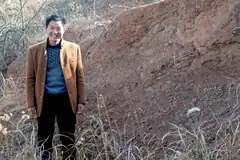 Zhang Fengchen at the Gaogou Formation | |
| Type | Geological formation |
| Sub-units | Upper Member, Lower Member |
| Underlies | Majiacun Formation |
| Overlies | Baiwan Formation |
| Lithology | |
| Primary | Conglomerate |
| Other | Mudstone |
| Location | |
| Coordinates | 33.4°N 112.9°E |
| Approximate paleocoordinates | 32.7°N 104.7°E |
| Region | Henan Province |
| Country | |
| Extent | Xixia Basin |
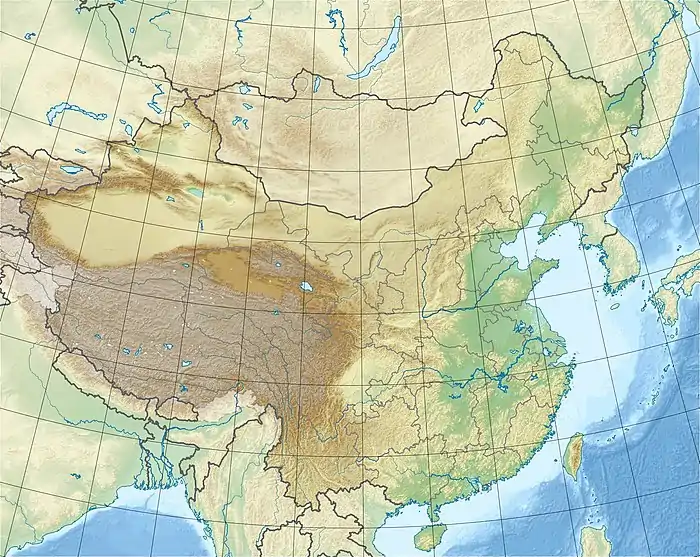 Gaogou Formation (China) 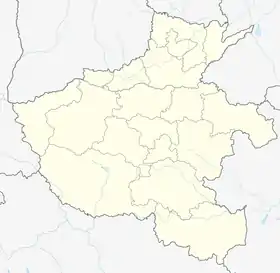 Gaogou Formation (Henan) | |
Paleobiota of the Gaogou Formation
Color key
|
Notes Uncertain or tentative taxa are in small text; |
Dinosaurs
| Genus | Species | Location | Stratigraphic Position | Material | Notes | Images |
|---|---|---|---|---|---|---|
| Baotianmansaurus | B. henanensis | Neixiang | "Partial vertebrae and scapula."[1] | A titanosauriform. | ||
| Beibeilong | B. sinensis | Heimaogou | "Embryonic skeleton with associated partial nest."[2] | A large caenagnathid. |  | |
Eggs
| Genus | Species | Location | Stratigraphic Position | Material | Notes | Images |
|---|---|---|---|---|---|---|
| Dendroolithus | D. xichuanensis | Xichuan | "Eggshell fragments and collapsed eggs."[3] | Dendroolithid eggs laid by ornithopods, sauropod or theropods. | ||
| Indeterminate | Xixia | "Intact eggs and egg clutches."[3] | Dendroolithid eggs laid by ornithopods, sauropod or theropods. | 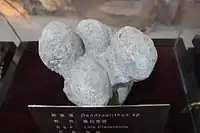 | ||
| Dictyoolithus | D. neixiangensis | Xixia | Not specified.[3] | Dictyoolithid eggs. | ||
| Faveoloolithus | Indeterminate | Nanxiang | "Single egg."[3] | Faveoloolithid egg. | ||
| Macroelongatoolithus | M. xixiaensis | Heimaogou | "Partial nest of 6-8 eggs, and eggshell fragments."[2] | Elongatoolithid eggs laid by Beibeilong. | .jpg.webp) | |
| M. xixiaensis | Neixiang, Xixia | "Isolated eggs and complete egg clutches."[3] | Elongatoolithid eggs laid by caenagnathids. | 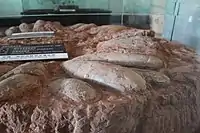 | ||
| Neixiangoolithus | N. yani | Neixiang | "Multiple egg clutches."[4] | Testudoolithid eggs laid by a turtle. | ||
| Paraspheroolithus | P. cf. irenensis | Xixia | "Complete egg clutches."[3] | Spheroolithid eggs. | ||
| Placoolithus | P. tumiaolingensis | Yunxian | "Several eggs and egg clutches."[5] | Dendroolithid eggs laid by ornithopods, sauropod or theropods. | ||
| Prismatoolithus | P. gebiensis | Neixiang, Xixia | "Several egg clutches."[3] | Prismatoolithid eggs laid by troodontids. | 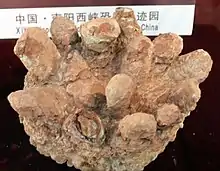 | |
| Youngoolithus | Y. xiaguanensis | Xixia | "Clutch with 4 eggs."[3] | Youngoolithid eggs. | ||
Flora
| Genus | Species | Location | Stratigraphic Position | Material | Notes | Images |
|---|---|---|---|---|---|---|
| Araucariaceae indet. | Indeterminate | Xixia | "Amber pieces."[6] | A conifer. | .png.webp) | |
| Plantae indet. | Indeterminate | Not specified. | Upper Member | "Rhizoliths."[7] | Root traces. | |
Invertebrates
| Genus | Species | Location | Stratigraphic Position | Material | Notes | Images |
|---|---|---|---|---|---|---|
| Beaconites | B. antarcticus | Not specified. | Upper Member | "Horizontal-overtical, straight to slightly curved, single, lined, meniscate burrows."[7] | Invertebrate traces. | |
| B. capronus | Not specified. | Upper Member | "Horizontal to vertical, straight to slightly curved, lined, unbranched burrows."[7] | Invertebrate traces. | ||
| B. coronus | Not specified. | Upper Member | "Mostly horizontal to vertical, meniscate burrows."[7] | Invertebrate traces. | ||
| Gastruichnus | G. xixiaensis | Not specified. | Upper Member | "Large, high dipping, slightly curved and unbranched burrow."[7] | Traces made by molluscs. | |
| Palaeophycus | P. heberti | Not specified. | Upper Member | "Straight to curved, horizontal to vertical, unbranched and lined burrows."[7] | Invertebrate traces. | |
| P. megas | Not specified. | Upper Member | "Curved, horizontal to vertical, unbranched and lined burrows."[7] | Invertebrate traces. | ||
| Skolithos | S. linearis | Not specified. | "Cylindrical burrows."[7] | Invertebrate traces. | ||
| S. magnus | Not specified. | "Cylindrical to subcylindrical, vertical and slightly curved burrows."[7] | Invertebrate traces. | |||
Turtles
| Genus | Species | Location | Stratigraphic Position | Material | Notes | Images |
|---|---|---|---|---|---|---|
| Yuchelys | Y. nanyangensis | Neixiang | "Partial skeleton with carapace."[8] | A nanhsiungchelyid. | ||
See also
References
- Zhang, X.; Lü, J.; Xu, L.; Li, J.; Yang, L.; Hu, W.; Jia, S.; Ji, Q.; Zhang, C. (2009). "A New Sauropod Dinosaur from the Late Cretaceous Gaogou Formation of Nanyang, Henan Province". Acta Geologica Sinica (English Edition). 83 (2): 212. doi:10.1111/j.1755-6724.2009.00032.x. S2CID 129422997.
- Pu, H.; Zelenitsky, D. K.; Lü, J.; Currie, P. J.; Carpenter, K.; Xu, L.; Koppelhus, E. B.; Jia, S.; Xiao, L.; Chuang, H.; Li, T.; Kundrát, M.; Shen, C. (2017). "Perinate and eggs of a giant caenagnathid dinosaur from the Late Cretaceous of central China". Nature Communications. 8 (14952): 14952. doi:10.1038/ncomms14952. PMC 5477524. PMID 28486442.
- Liang, X.; Wen, S.; Yang, D.; Zhou, S.; Wu, S. (2009). "Dinosaur eggs and dinosaur egg-bearing deposits (Upper Cretaceous) of Henan Province, China: Occurrences, palaeoenvironments, taphonomy and preservation". Progress in Natural Science. 19 (11): 1587−1601. doi:10.1016/j.pnsc.2009.06.012.
- Xu, L.; Xie, J.; Zhang, S.; Choi, S.; Kim, N.-H.; Gao, D.; Jin, X.; Jia, S.; Gao, Y. (2022). "Fossil turtle eggs from the Upper Cretaceous Gaogou Formation, Xiaguan-Gaoqiu Basin, Neixiang County, Henan Province, China: Interpretation of the transformation from aragonite to calcite in fossil turtle eggshell". Cretaceous Research. 134: 105166. doi:10.1016/j.cretres.2022.105166. S2CID 246627436.
- Zhang, S.; Yang, T.-R.; Li, Z.; Hu, Y. (2018). "New dinosaur egg material from Yunxian, Hubei Province, China resolves the classification of dendroolithid eggs" (PDF). Acta Palaeontologica Polonica. 63 (4): 671−678. doi:10.4202/app.00523.2018.
- Shi, G.; Dutta, S.; Paul, S.; Wang, B.; Jacques, F. M. B. (2014). "Terpenoid Compositions and Botanical Origins of Late Cretaceous and Miocene Amber from China". PLOS ONE. 9 (10): e111303. doi:10.1371/journal.pone.0111303. PMC 4213060. PMID 25354364.
- Wang, C.-Z.; Wang, J.; Hu, B.; Lu, X.-H. (2016). "Trace fossils and sedimentary environments of the upper cretaceous in the Xixia Basin, Southwestern Henan Province, China". Geodinamica Acta. 28 (1–2): 53−70. doi:10.1080/09853111.2015.1065307.
- Tong, H.; Xu, L.; Buffetaut, E.; Zhang, X.; Jia, S. (2012). "A new nanhsiungchelyid turtle from the Late Cretaceous of Neixiang, Henan Province, China". Annales de Paléontologie. 98 (4): 303–314. doi:10.1016/j.annpal.2012.08.001.
This article is issued from Wikipedia. The text is licensed under Creative Commons - Attribution - Sharealike. Additional terms may apply for the media files.